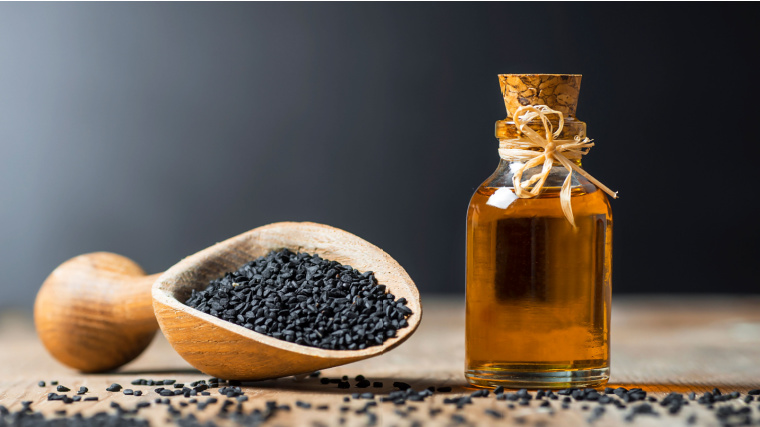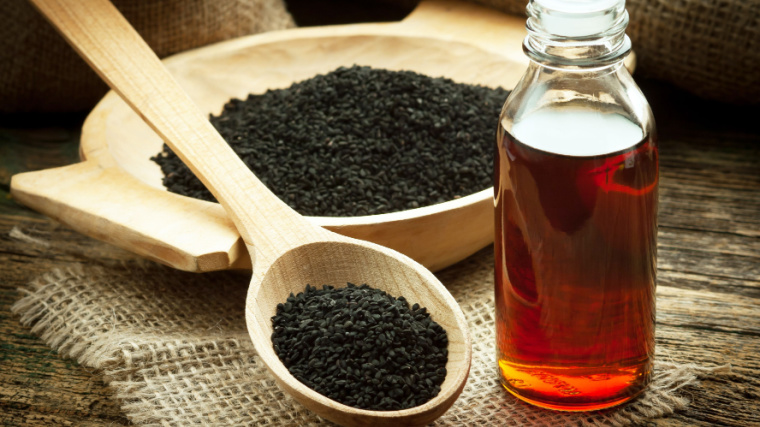A glance down any supplement aisle will advertise superfoods galore. One herb that has gained recent popularity in the Western supplement industry is black seed oil. Also known as black caraway, black cumin, or Kalonji, it comes from the ancient plant Nigella sativa (N. sativa). For over 2,000 years, people have used Nigella sativa seeds to treat various health conditions.
Black seed oil is extracted from Nigella sativa seeds (or black seeds) and packs many potential health benefits. It contains antioxidants and may have anti-inflammatory properties. Black seed oil has traditionally been used to treat conditions that result from chronic inflammation in the body, but using it may also help reduce inflammation temporarily caused by exercise.

Here, we’ll detail the scientific properties of black seed oil and get into the conditions it’s been used to help with. Then, we’ll look at some clinical studies to outline the potential benefits of black seed oil on your health by fighting chronic inflammation with natural antioxidants.
Editor’s Note: The content on BarBend is meant to be informative in nature, but it should not be taken as medical advice. When starting a new training regimen and/or diet, it is always a good idea to consult with a trusted medical professional. We are not a medical resource. The opinions and articles on this site are not intended for use as diagnosis, prevention, and/or treatment of health problems. They are not substitutes for consulting a qualified medical professional.
What Is Black Seed Oil?
The scientific name for black seed or black cumin is Nigella sativa L. The oil gets extracted from the seeds of the Nigella sativa plant, native to Northern Africa, the Eastern Mediterranean, India, and Southwestern Asia. In medicine practices across the globe, black cumin has been known as a panacea or a cure-all for many diseases and conditions caused by inflammation. (1)
Nigella sativa oil and seeds have been used in natural remedies for over 2,000 years across Indian and Arabic cultures. It’s popular in food and medicine for general wellness and to treat health conditions related to the cardiovascular, digestive, metabolic, and immune systems. (2)

[Read More: The 8 Best CBD Products]
Although it comes from an “ancient plant,” according to the World Health Organization (WHO), more than 75 percent of communities in resource-limited countries today mainly rely on medicinal plants for healthcare. More than 60 percent of these communities don’t have access to other forms of medicine. (3)
In countries with more access to allopathic medicine, black seed oil has gained popularity as a dietary supplement that can help treat diseases and conditions like metabolic syndromes, skin conditions, and obesity. Black seed oil has strong antioxidant properties, which led many researchers to investigate its effectiveness in treating these conditions. (3)
Nutrient Makeup
So, what is black seed oil, exactly? Let’s take a look at the nutritional composition. Black seeds are nutrient-dense. They contain plant-based protein, fiber, fatty acids, carbohydrates, vitamins, and minerals. Black seeds are high in amino acids, including glutamate, arginine, cysteine, and methionine. They also contain iron, phosphorus, zinc, calcium, and niacin. (3)
Black seed is often called black cumin, but it’s not the same as the spice cumin. Still, it has a distinct flavor and is often used as a spice when preparing certain foods. (3)
[Read More: The 7 Best Supplement Stacks]
Beyond the nutrients, black seed oil contains several phytochemicals and constituents, including thymoquinone, phytosterols, alkaloids, saponins, flavonoids, tocols, and polyphenols. Many of these substances act as antioxidants in your body. Most potential health benefits may come from the most powerful constituent of black seed oil: thymoquinone. (1)(2)
Thymoquinone (TQ)
Many studies that examine black seed oil benefits focus on the most bioactive constituent: thymoquinone (TQ). Research shows TQ may help reduce oxidative stress caused by inflammation and boost the immune system. As an antioxidant, TQ helps fight free radicals, improves cellular health, and increases energy metabolism. In turn, it’s been used to protect against cardiovascular, metabolic, digestive, respiratory, and neurological disorders. (1)
Studies on TQ’s impact on cellular health show it may also have anticancer, antidiabetic, antiviral, and antimicrobial potential. (2)

[Read More: The 12 Best Greens Powders]
When you ingest black seed oil, TQ may help fight diseases inside your body. You can also use black seed oil as a topical treatment. TQ’s anti-inflammatory properties may improve skin conditions like eczema, psoriasis, and acne, and assist in wound healing. (4)
Potential Benefits of Black Seed Oil
By helping to fight free radicals caused by oxidative stress, black seed oil may reduce inflammation in your body. In turn, it may improve skin conditions, help treat type 2 diabetes, lower your blood pressure and cholesterol, and potentially help with weight loss.
[Read More: The 18 Best Pre-Workout, RDN-Approved (Personally Tested)]
Many people in the world today rely solely on plants like Nigella sativa for medicinal treatments. In this section, we’ll look at clinical studies examining the potential benefits of black seed oil on these health conditions when used in addition to allopathic medication and exercise.
- Reduce Inflammation
- Improve Skin Conditions
- Help Treat Type 2 Diabetes
- Lower Blood Pressure
- Improve Cholesterol Levels
- Help With Weight Loss
Reduce Inflammation
The main reason black seed oil may help to treat so many health conditions is because it starts with potentially reducing inflammation. Chronic inflammation causes progressive damage to your cells and neurons. Research links chronic inflammation with many chronic illnesses, including type 2 diabetes, metabolic syndromes, cancers, and cardiovascular diseases. (3)
The anti-inflammatory properties of black seed oil and thymoquinone may help reduce some chronic inflammation associated with these diseases. Then, people with these conditions may find some relief from their symptoms. (3)
[Read More: Omega 3 Benefits — More Muscle, Better Recovery, and Enhanced Endurance]
Taking drugs and medications to treat these conditions may cause side effects that can add further inflammation and free radicals to your body. Black seed oil can be used as an “antidote” to try and relieve some adverse effects. (1)
Exercise also causes free radicals, oxidative stress, and inflammation in your body. It’s temporary and considered “good stress.” It’s also necessary for strength adaptations to occur. Still, having antioxidants like black seed oil in your diet before or during your workout may help delay fatigue, reduce muscle damage, and improve muscle recovery. (5)(6)
Improve Skin Conditions
Black seed oil may help improve skin conditions like psoriasis and eczema. (4)
Psoriasis is an autoimmune disorder that causes itchy and painful skin. In one study, Nigella sativa seed extract helped decrease inflammation and increase skin thickness in people with psoriasis. (4)
In animal studies, topical black seed oil reduced psoriasis lesions in rats. (7)

[Read More: The 7 Best Vitamin B Complexes]
In small studies on humans, a natural topical ointment made of plant-based materials helped reduce psoriasis symptoms. The ointment contained black seed oil, olive oil, cocoa butter, tea tree oil, vitamin A, and vitamin B12. These substances together may have provided the anti-inflammatory and antioxidant effect — not solely black seed oil. (8)
Eczema is a disorder that causes itchy, dry skin, rashes, and redness. In animal studies, oral and topical thymoquinone reduced eczema symptoms in mice. (9)
In small studies on hand eczema in humans, Nigella sativa oil was equally as effective as the steroid Betamethasone in decreasing symptoms and improving quality of life. In this study, both were more effective than the skincare product Eucerin. (10)
Help Treat Type 2 Diabetes
Diabetes is a condition caused by chronic elevation of blood sugar levels or blood glucose. This blood sugar elevation creates reactive oxygen species (ROS), causes cellular damage, and further health complications. It’s thought that N. sativa oil has antidiabetic properties because it can reduce ROS and inflammation. (2)(3)
In a study on patients with type 2 diabetes taking Nigella sativa oil for 12 weeks, people who took the oil had improved insulin levels, insulin resistance, and lower blood sugar levels than those in the placebo-controlled group. (11)
[Read More: The Best Healthy Fast Food Options at the Most Popular U.S. Chains]
A systematic review published in 2019 investigated the effect of Nigella sativa on type 2 diabetes when taken in conjunction with oral antidiabetic drugs. The review scanned studies from 1865 to November 2019 and found that all studies showed a positive effect of Nigella sativa on type 2 diabetes symptoms. Fasting blood glucose and blood sugar levels were reduced, and insulin resistance was improved. (12)
The systematic review states that Nigella sativa oil can be a beneficial addition to type 2 diabetes treatment. (12)
Lower Blood Pressure
Hypertension, or high blood pressure, is a condition that can lead to heart disease. When combined with other treatments, black seed oil may help lower blood pressure, but research shows mixed results.
A systematic review of randomized controlled trials investigated the link between Nigella sativa supplementation and high blood pressure. The meta-analysis suggested that short-term powdered Nigella sativa treatment can reduce systolic and diastolic blood pressure. However, the review notes that more research is needed on the long-term effects. (13)

In a double-blind, randomized controlled trial on older adults with hypertension, Nigella sativa seed extract was ineffective at lowering blood pressure. (14)
In a clinical study on people with mild to moderate hypertension, black cumin oil was able to lower blood pressure significantly. (1)
Improve Cholesterol Levels
There are two types of cholesterol: low-density lipoprotein (LDL) cholesterol is known as “bad” cholesterol, and high-density lipoprotein (HDL) cholesterol is your “good” cholesterol. It’s best to have lower levels of LDL and higher levels of HDL. Your cholesterol levels can affect your heart health and risk of heart disease.
Eating a healthy diet and regular exercise helps control cholesterol levels. However, supplementing with black seed oil may also help decrease LDL and increase HDL.
[Read More: Does Creatine Make You Gain Weight?]
In a study on people following a low-fat diet and exercising regularly, the group taking Nigella sativa had lower LDL and HDL levels than the placebo-controlled group. (15)
Help With Weight Loss
The general advice for people trying to lose weight is to eat fewer calories than you use. However, it’s not always a simple equation. Some people with obesity or other metabolic, hormonal, or medical issues struggle with weight loss.
Many studies suggest that black seed oil may help with weight loss. Multiple other factors are involved, and it’s unlikely that black seed oil alone caused weight loss. However, since thymoquinone in black seed oil can reduce inflammation and impact other metabolic factors, that may be how it helps with weight loss.
Here are some findings from a few studies.
Multiple randomized clinical trials show that taking Nigella sativa oil while following a low-calorie diet decreased body weight in cisgender women with obesity. In a study on cisgender men with obesity, taking three grams of Nigella sativa seeds daily for three months reduced body weight and waist circumference. (2)

[Read More: 20 High-Protein, Low-Calorie Foods Worth Subbing Into Your Diet]
A double-blind, placebo-controlled, randomized clinical trial investigated the effect of Nigella sativa on body composition and appetite in cisgender women with obesity. The women took 2000 milligrams of N. sativa oil daily for eight weeks. In the end, the subjects had decreased body weight and waist circumference. They also had reduced appetites and increased satiety or feelings of fullness. (16)
In a systematic review of multiple clinical trials on Nigella sativa and obesity, many studies showed a positive effect, and some showed no effect. The review concludes that N. sativa supplementation may have a moderate effect on reducing body weight and waist circumference when combined with other interventions. The review states that limited high-quality studies are available and to interpret the results cautiously. (17)
Your Takeaways
Now that you know how black seed oil may be able to boost your health, we’ll leave you with some key points to remember.
- Black seed oil is extracted from the ancient plant Nigella sativa seeds, native to Northern Africa, the Middle East, India, and Southwestern Asia. For over 2,000 years, people worldwide have used it to treat health conditions.
- The most potent bioactive compound in black seed oil is called thymoquinone. It is an antioxidant with anti-inflammatory properties.
- Chronic inflammation in the body is associated with multiple chronic illnesses, including cardiovascular diseases, metabolic diseases, cancers, digestive disorders, and neurological disorders. Thymoquinone in black seed oil fights chronic inflammation in the body and can help multiple health conditions.
- Clinical trials have investigated the health benefits of black seed oil. By fighting inflammation in the body, black seed oil may help certain conditions. Black seed oil may improve symptoms of skin conditions like psoriasis and eczema. It may help improve health markers of type 2 diabetes. It may help lower blood pressure in people with hypertension. It can help regulate cholesterol levels. It may help with weight loss.
- In all of these instances, black seed oil is used in conjunction with other interventions or medications. Results are often mixed across multiple studies.
Oiling Up
Black seed oil has been used in medicine across the globe to alleviate symptoms of many illnesses over centuries. To this day, the WHO states that much of the world’s population relies on natural remedies as their primary source of health care. The main health benefit of black seed oil is that it contains thymoquinone, which fights inflammation.
Reducing inflammation in the body can improve symptoms of skin conditions, type 2 diabetes, hypertension, cholesterol, and obesity. Studies often come up with conflicting conclusions, and in many cases, black seed oil isn’t the only treatment. Still, there haven’t been adverse effects observed in these studies.
It’s always best to check with a healthcare provider before trying a new supplement. But, if fighting inflammation from a natural plant-based source sounds good to you, black seed oil may be worth a try.
FAQs
Let’s address any lingering questions you have on black seed oil from the Nigella sativa plant.
Black seed oil may be good for many health conditions, including skin conditions, chronic inflammation, hypertension, type 2 diabetes, and high cholesterol.
Taking black seed oil every day should be okay, but it’s always best to check with a doctor before taking a new supplement, especially if you’re pregnant.
You can take black seed oil at any time. Taking it with food may help with digestion.
If you buy a black seed oil supplement, it’s best to follow the recommended serving size or start smaller.
References
- Hannan MA, Rahman MA, Sohag AAM, Uddin MJ, Dash R, Sikder MH, Rahman MS, Timalsina B, Munni YA, Sarker PP, Alam M, Mohibbullah M, Haque MN, Jahan I, Hossain MT, Afrin T, Rahman MM, Tahjib-Ul-Arif M, Mitra S, Oktaviani DF, Khan MK, Choi HJ, Moon IS, Kim B. Black Cumin (Nigella sativa L.): A Comprehensive Review on Phytochemistry, Health Benefits, Molecular Pharmacology, and Safety. Nutrients. 2021 May 24;13(6):1784.
- Tavakkoli A, Mahdian V, Razavi BM, Hosseinzadeh H. Review on Clinical Trials of Black Seed (Nigella sativa ) and Its Active Constituent, Thymoquinone. J Pharmacopuncture. 2017 Sep;20(3):179-193.
- Yimer EM, Tuem KB, Karim A, Ur-Rehman N, Anwar F. Nigella sativa L. (Black Cumin): A Promising Natural Remedy for Wide Range of Illnesses. Evid Based Complement Alternat Med. 2019 May 12;2019:1528635.
- Eid AM, Elmarzugi NA, Abu Ayyash LM, Sawafta MN, Daana HI. A Review on the Cosmeceutical and External Applications of Nigella sativa. J Trop Med. 2017;2017:7092514.
- Powers SK, Jackson MJ. Exercise-induced oxidative stress: cellular mechanisms and impact on muscle force production. Physiol Rev. 2008 Oct;88(4):1243-76.
- Canals-Garzón C, Guisado-Barrilao R, Martínez-García D, Chirosa-Ríos IJ, Jerez-Mayorga D, Guisado-Requena IM. Effect of Antioxidant Supplementation on Markers of Oxidative Stress and Muscle Damage after Strength Exercise: A Systematic Review. Int J Environ Res Public Health. 2022 Feb 5;19(3):1803.
- Okasha EF, Bayomy NA, Abdelaziz EZ. Effect of Topical Application of Black Seed Oil on Imiquimod-Induced Psoriasis-like Lesions in the Thin Skin of Adult Male Albino Rats. Anat Rec (Hoboken). 2018 Jan;301(1):166-174.
- Michalsen A, Eddin O, Salama A. A case series of the effects of a novel composition of a traditional natural preparation for the treatment of psoriasis. J Tradit Complement Med. 2015 Sep 19;6(4):395-398.
- Aslam H, Shahzad M, Shabbir A, Irshad S. Immunomodulatory effect of thymoquinone on atopic dermatitis. Mol Immunol. 2018 Sep;101:276-283.
- Yousefi M, Barikbin B, Kamalinejad M, Abolhasani E, Ebadi A, Younespour S, Manouchehrian M, Hejazi S. Comparison of therapeutic effect of topical Nigella with Betamethasone and Eucerin in hand eczema. J Eur Acad Dermatol Venereol. 2013 Dec;27(12):1498-504.
- Heshmati J, Namazi N, Memarzadeh MR, Taghizadeh M, Kolandooz F. Nigella sativa oil affects glucose metabolism and lipid concentrations in patients with type 2 diabetes: a randomized, double-blind, placebo-controlled trial. Food Res Int. 2015;70:87–93.
- Hamdan, Amiza, Ruszymah Haji Idrus, and Mohd Helmy Mokhtar. 2019. “Effects of Nigella Sativa on Type-2 Diabetes Mellitus: A Systematic Review” International Journal of Environmental Research and Public Health 16, no. 24: 4911.
- Sahebkar A, Soranna D, Liu X, Thomopoulos C, Simental-Mendia LE, Derosa G, Maffioli P, Parati G. A systematic review and meta-analysis of randomized controlled trials investigating the effects of supplementation with Nigella sativa (black seed) on blood pressure. J Hypertens. 2016 Nov;34(11):2127-35.
- Rizka A, Setiati S, Lydia A, Dewiasty E. Effect of Nigella sativa Seed Extract for Hypertension in Elderly: a Double-blind, Randomized Controlled Trial. Acta Med Indones. 2017 Oct;49(4):307-313.
- Moeen-ud-din H, Murad S, Fatima A. Placebo controlled study on comparison of effects of Nigella sativa and nicotinic acid along with low fat diet and physical exercise on LDL-cholesterol and HDL-cholesterol. Pak J Med Health Sci. 2014;8:306–9.
- Safi S, Razmpoosh E, Fallahzadeh H, Mazaheri M, Abdollahi N, Nazari M, Nadjarzadeh A, Salehi-Abargouei A. The effect of Nigella sativa on appetite, anthropometric and body composition indices among overweight and obese women: A crossover, double-blind, placebo-controlled, randomized clinical trial. Complement Ther Med. 2021 Mar;57:102653.
- Nazli Namazi, Bagher Larijani, Mohammad Hossein Ayati, Mohammad Abdollahi,
- The effects of Nigella sativa L. on obesity: A systematic review and meta-analysis, Journal of Ethnopharmacology, Volume 219, 2018, Pages 173-181, ISSN 0378-8741.
Featured Image: Halil ibrahim mescioglu / Shutterstock
The post 6 Black Seed Oil Benefits You Should Know About appeared first on BarBend.
